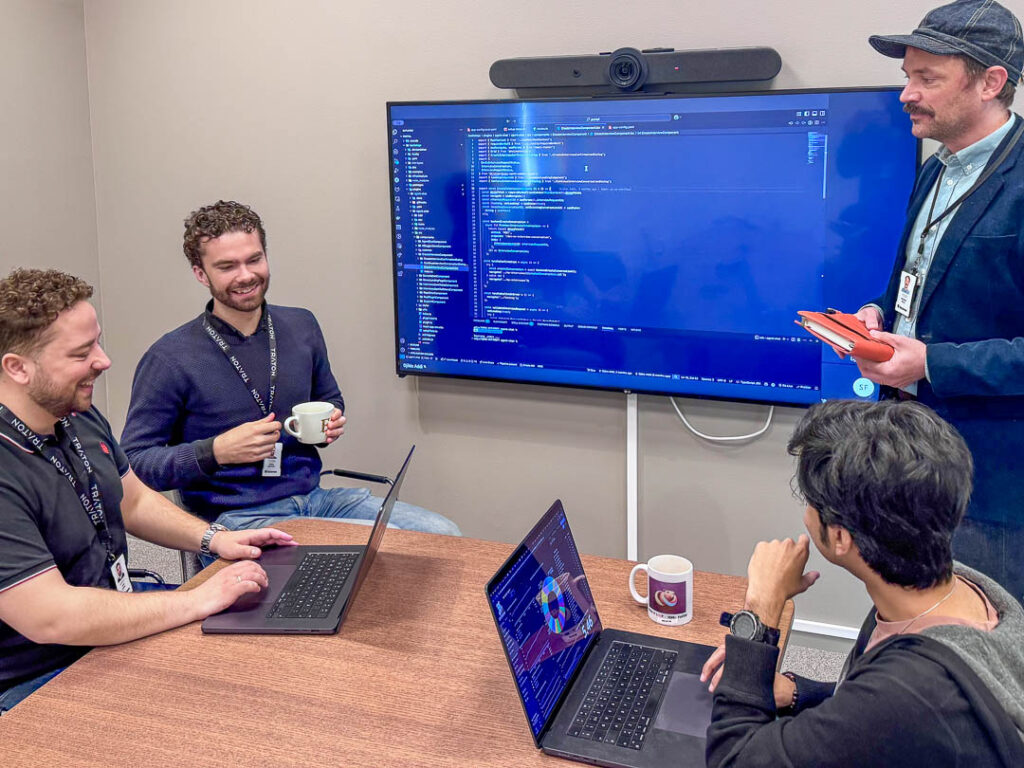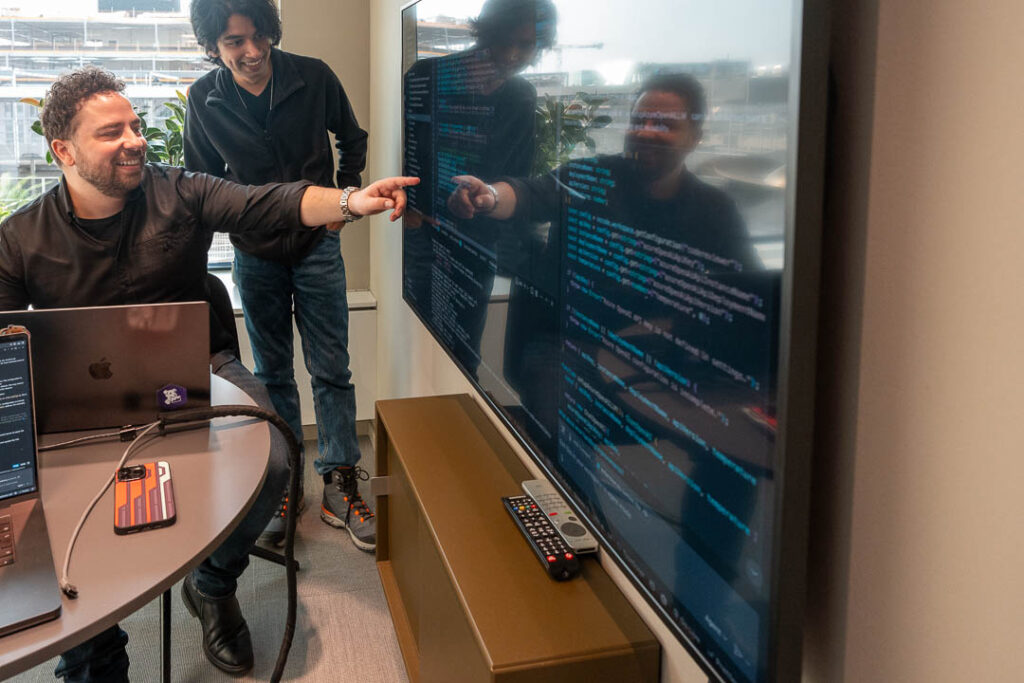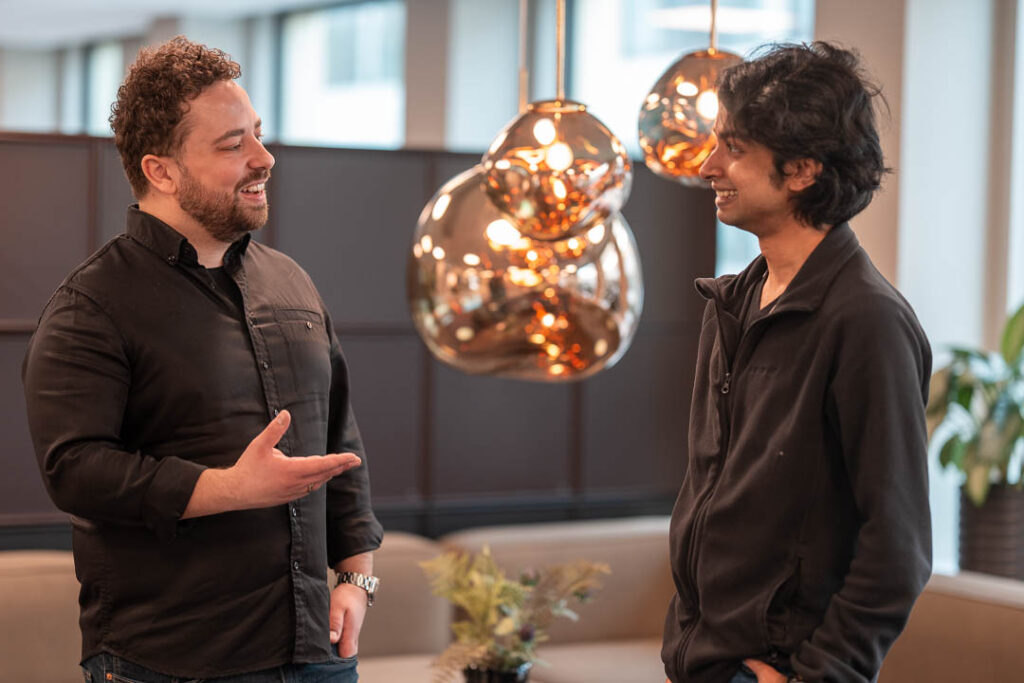Introduction
What happens when you combine a passionate development team, a dash of Tesla-inspired thinking, and the principles of Mob Programming, with AI as an active participant? At Traton-Scania, the AI-Enablement team is doing just that, transforming how they build software and collaborate. This is their story.
Meet the Team
The AI-Enablement team at Scania (now Traton) is on a mission: to empower developers across the organization with tools, agents, and know-how to enhance the developer experience. They focus on using AI agents to remove friction, accelerate workflows, and promote collaborative efficiency.
Their dual role includes building AI agents and acting as consultants within Traton to help teams explore how AI can be a valuable partner and accelerate software delivery.
They even created a developer experience interview agent to gather insights into developer pain points.

Discovering Mob Programming: Sparked at Crisp
Mob Programming (also known as Software Teaming, as coined by Woody Zuill) came onto the team’s radar through a workshop at Crisp led by Joe Justice. Joe’s stories of Tesla’s #MobAI approach—where AI is embedded into every part of the workflow—inspired the team to rethink how they work. The turning point was seeing how Tesla “mobs everything”—not just coding—with AI fully integrated into the loop.
This resonated deeply with their mission at Traton: solving problems faster, avoiding key-person dependencies, and reducing technical debt through shared ownership. The course reinforced their commitment to collaboration over tools—one of the cornerstones of the Agile Manifesto—and gave them the confidence to try a radically different approach to teamwork.
From Theory to Practice
“We use AI like a superintelligent advisor—always available, never tired.” — Addi
Starting small, the team began mobbing on development tasks. Their setup evolved into daily morning mob sessions open to others via a shared calendar. This reduced meetings and encouraged spontaneous collaboration with stakeholders.
Key ingredients:
- Daily “extended stand-ups” to discuss strategy.
- Flexible use of roles (driver, navigator, advisor) guided by team dynamics rather than strict timers.
- Integration of AI tools (e.g., coding copilots, code analyzers, AI research buddies).
- Psychological safety and open feedback as team norms.
AI is viewed as a “superintelligent advisor,” always available for debugging, refactoring, or analyzing code. It’s not replacing them—it’s amplifying their capabilities.
A Typical Day in the #MobAI Team
“We don’t wait for each other. If someone needs to drop off, the rest continue mobbing.” — Akhil
- 08:45 – Extended Stand-up
- A quick round of updates with the team and manager, or product manager.
- Space for deeper technical or strategic discussions.
- Alignment check: Are we solving the right problems?
- 09:00–12:00 – Mob Programming Session
- Focused collaboration on development tasks.
- Roles like driver, navigator, and advisor rotate naturally.
- Open calendar slot: stakeholders can drop in to give feedback or co-create.
- 12:00 – Lunch
- 13:00–16:00 – Flexible Collaboration
- Usually, continue mobbing if the team has a good flow.
- Option for solo work, research, or individual learning.
- Occasionally split for specific tasks, but with quick reconnection.
- All Day
- Minimized meetings.
- High psychological safety: questions, reflection, and real-time learning are encouraged.
- AI tools are integrated throughout (copilots, chat assistants, research helpers).

The Human Side: Building Trust and Safety
Psychological safety didn’t just happen—it was intentionally nurtured. From day one, the team prioritized open communication and mutual respect. They built a foundation where feedback is seen as a gift, not a threat, and where no idea is too “stupid” to be explored. Disagreements are welcomed as healthy signs of engagement, and personal learning journeys are supported alongside team goals. They regularly check in on how collaboration is going, bring up tensions early, and remind each other that critique is always directed at ideas, not individuals. This culture of trust makes it safe to ask questions, challenge assumptions, and learn out loud—essentials for a team working at the edge of both technology and ways of working.
“An idea can be completely stupid—and that’s okay. It doesn’t mean I’m stupid. That’s the kind of safety we have in our team.” — Addi
Pitfalls to Watch Out For
“We tried splitting up to hit a deadline, but reintegration was painful. We’re faster together.” — Akhil
While Mob Programming with AI offers many benefits, it’s not without its traps. One common pitfall is falling back into solo work during deadline pressure—something the team at Traton experimented with and later regretted. Although it seemed efficient in the short term, it led to a heavier reintegration burden, lost shared context, and more technical debt.
Another trap is letting the “driver” carry all the cognitive load, turning others into passive observers. The team learned to balance roles, communicate actively, and adapt their mobbing style based on task complexity and energy levels.
Lastly, psychological safety must be nurtured continuously—without it, collaboration and learning break down. Success requires intention, discipline, and a willingness to experiment and reflect often.
The Impact
“Mob programming removed the need for code reviews. We review as we build.” — Addi
Since adopting #MobAI, the team has:
- Minimized technical debt by maintaining shared code ownership.
- Eliminated key-person dependencies—anyone can pick up, demo, or continue work.
- Reduced code review overhead as everything is co-developed in real-time.
- Increased learning velocity, with daily discussions deepening shared knowledge, always having a shared context.
- Replaced status meetings with real-time collaboration.
- Customer-first approach. Talking with customers daily or inviting them to the Mob and then adapting every day instead of infrequent planning meetings.
They also found that temporarily splitting up for speed (to meet a deadline) backfired: reintegration took longer than expected, reaffirming the value of staying together.

Getting Started: Tips for Other Teams
“Start small. Talk about how it feels. Don’t overcomplicate it—just try it.” — Akhil
Want to try #MobAI? Here’s what they suggest:
- Start with a small task and try mobbing it.
- Evaluate the vibe—don’t be too rigid initially.
- Rotate roles and talk openly about how it feels.
- Use AI as a teammate, not just a tool.
- Secure management support to minimize meetings and allow for deep work without disrupting the flow. Try it out and share the results.
- Visualize shared context by using a digital board.
They emphasize that the most critical ingredient is trust and psychological safety—this is what allows everyone to speak up, learn together, and grow.
Final Reflections & Inspiration
“I’m kind of surprised by how fast the team learned—just a couple of months in and the improvement was amazing.” — Akhil
The team is proud of the speed and quality of their delivery and how quickly they’ve learned together. Mob Programming with AI has made their team resilient, efficient, and deeply aligned.
They hope their story inspires others to explore what’s possible when we stop talking about work and start doing it—together.
Want to Try This?
Inspired? Learn #MobAI with Joe Justice, or reach out to learn how your team can explore Mob Programming, Agile, and AI-powered teamwork.




